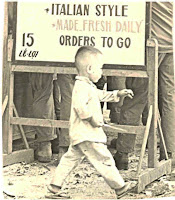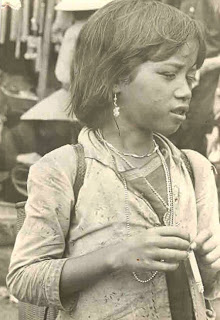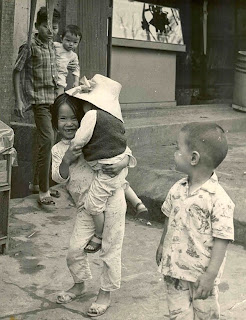
There was simply no time to relax when we got back to the 330th and, at the same time, things seemed more and more boring. Most of the military action had settled down. A few ambushes here and there. I’m sure that was anything but boring for those being ambushed. We alerted the 4th ID to a few of them, briefed a colonel or two on what was happening around the Mang Yang Pass, taught at the school, walked or hitched downtown, read book after book (I finished the novels and poems of Thomas Hardy), dodged small red tornados. Christmas was coming soon and we had a truce for that day and a truce for the last day of January, the Lunar New Year.
But we did start getting some odd messages shortly after Christmas and those were not even encrypted. Someone announced that a provisional revolutionary government (PRG) had been established in An Khe, a shadow government for the RVN government in that town, a kind of government in waiting. Shortly after that, similar messages were sent north from Qui Nhon and Ban Me Thuot, from Dak To and Kon Tum, and then from hamlets and villages all over the Central Highlands. Frankly, we had no idea of what all that meant.
With hindsight, in February and March, we became pretty confident that the establishment (or apparent establishment) of all those PRGs (hamlet, village, city, province levels) had something to do with one of the stated goals the NLF and North Vietnam had for the upcoming Tet Offensive of 1968: to encourage an uprising of people from all over the southern region. If an uprising did occur, they might well have wanted an organization ready to step in. A moot point since no uprising occurred.
As for us: we kept slogging through messages pretty blindly. Other units were translating similar messages in their regions. If such shadow NLF governments were truly being established (and I don’t know that that actually happened because if it did those governments were ignored in 1975 after the tanks rolled into Saigon), then the NLF, in the months prior to Tet, had established a vast network of PRGs all over the South. As for me, I just worked. Allen just worked. Richard just worked and Jim and Will and the whole cast and crew in the Operations Tent on Engineer Hill. We all went to the office, put in our time, and got paid.

We worked. We played: on the Hill and downtown. I spent much of my downtown time chatting with kids on the dusty red streets of Pleiku, usually fairly close to the market on Le Loi Street and the intersection of two major highway: 14 And 19. I had purchased both a Yashika Mat 120 and an inexpensive Minolta SLR, 35mm camera. Allen Hallmark bought a Minolta 101, a really fine camera for its day. He became an exceptionally fine photographer, eventually becoming a newspaper photographer in Medford, Oregon.
One of the things I liked about the Yashika was that it had one of those fake 90 degree lenses that allowed me to point the camera one direction and take a picture to the right. Almost all of the pictures in this blog were taken with that camera and most of those were of the children of Pleiku. These were the people, those children, who were most affected by the war, by our having gone to Vietnam. Most of them seemed cheerful in spite of everything, but their eyes could be hauntingly sad and hurt.

The Things We Leave Behind
War children. None of the ones in the photographs had known anything but war since they were born. Many of them were children of American soldiers and Vietnamese prostitutes, children with no futures.
Always the children. Chocolate bars
in World War II. Pictures with GIs.
Dirty, crying, doing what they have to.
We helped make them what they are.
They grow up in war zones, sacrifice
childhood, parents. Yet, somehow,
they survive. And the war, too: it
is always there: in their lips, their eyes.
We came to Vietnam by ship or airplane. Most of us put in a year, marked days off our short-timer's calendars, chalked up the experience to our youth, and left. We returned to whatever we had meant to be or had discovered we would become. The children? They remained, grew up, made whatever they could of what remained of their lives. We know the children of American GIs and Vietnamese prostitutes suffered terrible discrimination problems. The Vietnamese, after all, are no less racist than are we Americans.

It is much too easy to wash our hands of everything, to come up with some idea of this or that, some way to evade responsibility. “It was their war; we just went in to help.” “The dominoes were poised to fall.” “They shot at two of our ships.”
Excuses! We play huge board games with the lives of real people and real people are the game pieces. When an American soldier dies, a whole group of people (parents, relatives, friends) dies a little bit with him or her. When a Vietnamese, Iraqi, Afghani, Somali, Serb soldier dies, another group of people dies a little bit at the same time. John Donne said it best:
No man is an island entire of itself; every man
is a piece of the continent, a part of the main;
if a clod be washed away by the sea, Europe
is the less, as well as if a promontory were, as
well as any manner of thy friends or of thine
own were; any man's death diminishes me,
because I am involved in mankind.
And therefore never send to know for whom
the bell tolls; it tolls for thee.
thinking about how it would feel to be living in those moments in that place reading Thomas Hardy. Relativity governs so much of our responses. Palmer, thank you for writing all this.
ReplyDeleteCarol Levin